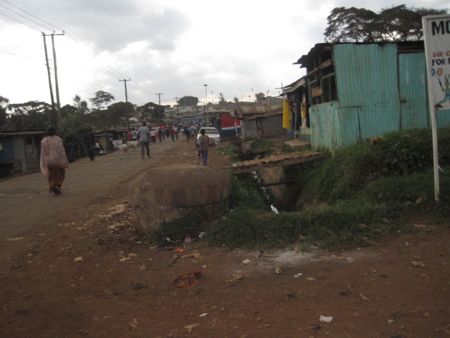This post is part of a series of reports from Global Voices’ collaboration with Map Kibera and Map Mathare that took place during the Global Voices Summit in Nairobi in July 2012.
Story and photos by Kevin Rennie
“Kenya needs leaders not dealers,” says Hamza Ahmed. She is helping to organize women voters in Nairobi’s slum district of Kibera where many people survive on just one meal a day. Home to over 170,000 people, it is just 5 kilometers from the centre of Kenya's capital Nairobi.
During a visit to the Map Kibera project a small group of us from the Global Voices Citizen Media Summit 2012 were fortunate enough to meet two local people who are working to ensure that next year's national elections are a success in all senses of the word.
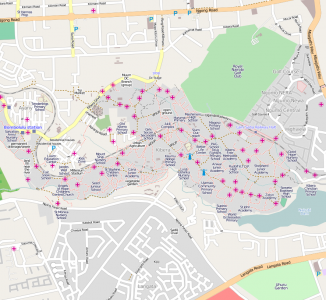
Map Kibera – courtesy OpenStreetMap (CC BY-SA)
Hamza is an energetic, passionate, and persuasive women in her mid-sixties. We discovered that we were born the same year. Together with Tobias Omondi, who is organising disabled voters, she is working to end political corruption. According to Hamza, they are tired of one-time reformers who are self-seekers exploiting their people. They are challenging those who promise a better life to the poor but use them for their own benefit.
They are doing everything in their power to ensure that there is no repeat of the bloodshed during the 2008 crisis that followed the 2007 presidential election. They blame politicians and their friends for inciting people to hatred and violence.
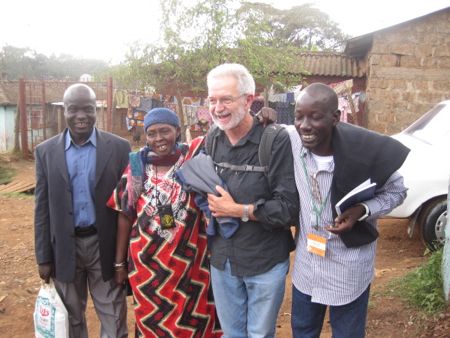
Tobias Omonde, Hamza Ahmed, Kevin Rennie, Boukary Konaté
Following South Africa’s lead, Hamza has a practical attitude to reconciliation, “We can only forgive those who accept they have done wrong”.
We met at the Mchanganyiko Hall which is a local school, women’s centre, and community meeting place for events such as candidate forums. It was opened by the Kenyan Prime Minister Raila Odinga and the French Ambassador in early 2012.
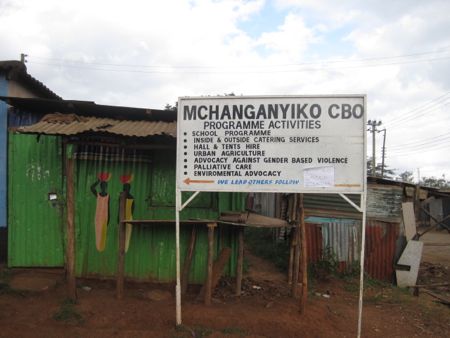
Mchangyiko Centre, Kibera, Nairobi
Tobias shared the frustrations of working on a rights project for the disabled. “Five percent of government jobs are reserved for those with disabilities. However most are not filled, as 90% do not have the basic qualification at Form 4.” Training is an urgent need.
Steve Banner of the Kibera News Network explains in his blog post How citizen media can help ensure peaceful elections in Kenya in 2012-13:
In informal settlements and slums such as Kibera, where the post Election Violence was at its peak, the rise of Citizen journalism has helped in information gathering and sharing. hence becoming a vital tool to spread the message of peace among the youths, who are mostly the target by politicians in carrying out negative vices and violence in the community.
Citizen media can also get to monitor elections from the grassroots since they are community based, hence helping to bridge the gap of misinformation which may have contributed to last post election violence.
They also organise Peace walks within Kibera which help bring together the community and the aspiring political candidates who give speeches preaching peace and togetherness among the community members.
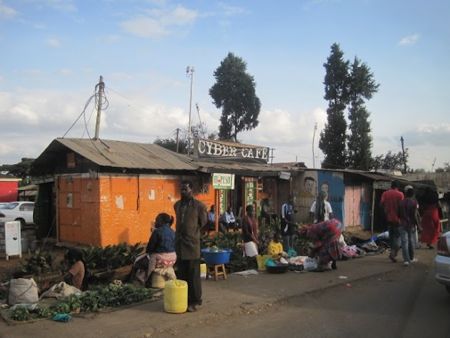
Kibera Cyber Cafe
Steve’s post won the the Global Voices Summit 2012 blogging scholarship competition.
In Kibera, the internet is used mainly by 15 to 35 year-olds. Although there is access such as cyber cafes within Kibera, the widespread access to mobile phones has made texting a useful means of speedy communication. Time will tell whether it can combat the spread of rumour and fear during a future crisis.
There are related posts on Rising Voices and a report on the summit workshop The State of Kenyan Citizen Media.
